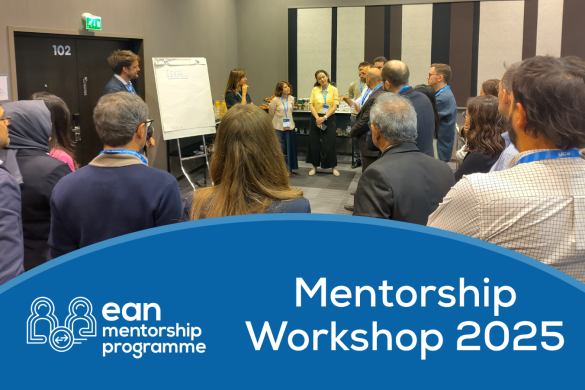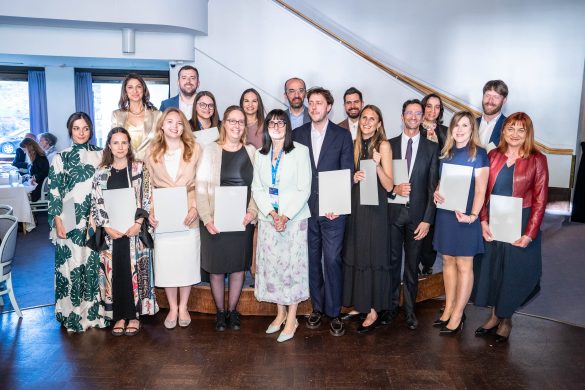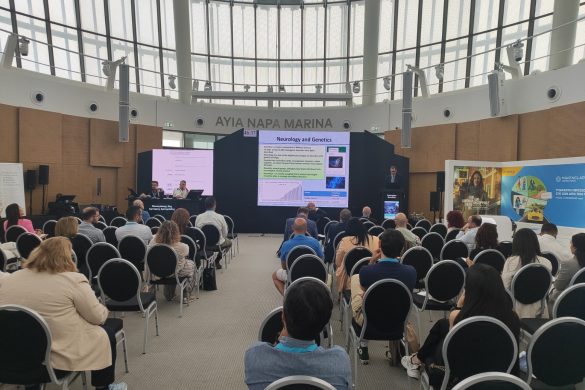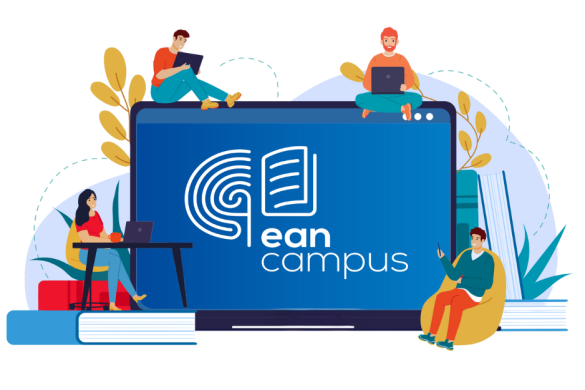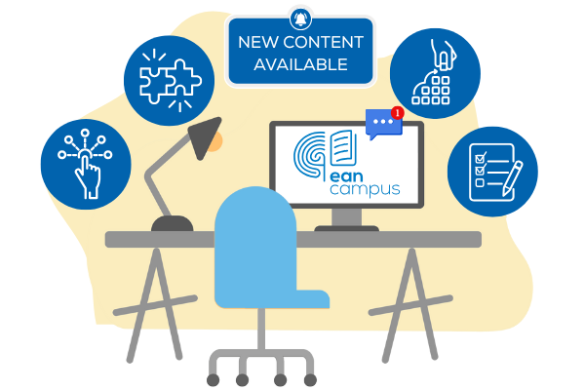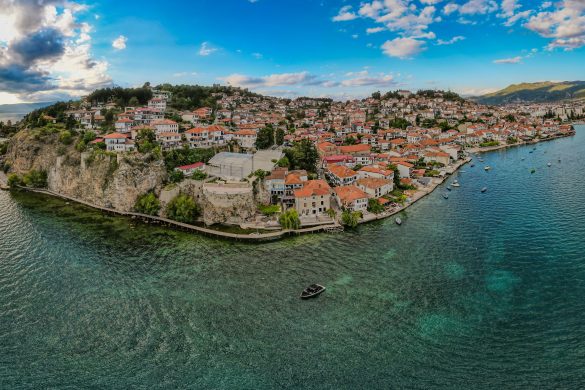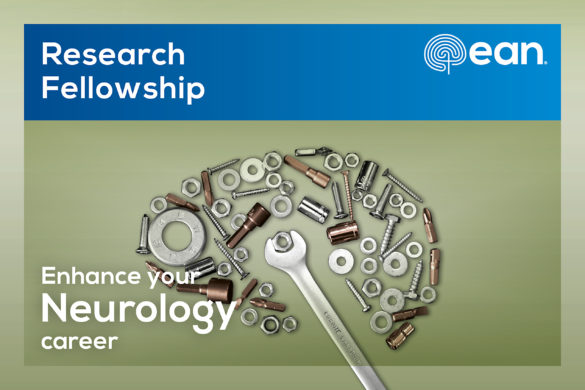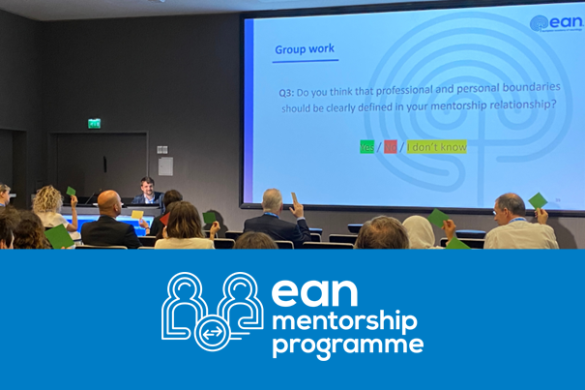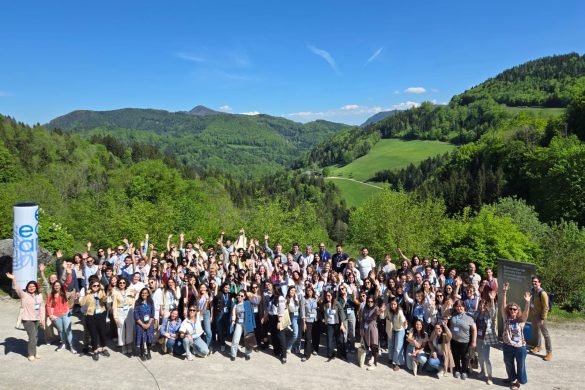Report from Maria Paola Cabboi from Italy visiting the Laboratory of Histology of the Neurology Clinic, University of Würzburg, Germany under the supervision of Professor Claudia Sommer
I attended the Laboratory of Histology of the Neurology Clinic of the University of Würzburg from October 1 to November 9 2015.
My goal was to acquire skills, both theoretical and practical, in the field of skin biopsy for the diagnosis of small fiber neuropathy.
During the first two weeks I was mostly approached to laboratory methods: first accompanied by the technical staff, and then alone, I learned the technique of immunohistochemistry and immunofluorescence. I also learned how to prepare the sample of skin (washing, cutting and fixing of the slide).
In the second part of my internship I acquired the skill to run myself the sample taking of skin.
Followed by the staff, I learned to perform the count of small fibers on the skin sample using a fluorescence microscope. I also learned to do a qualitative evaluation of the innervation of sweat glands to assess vegetative value of skin innervation.
Throughout the period I had the opportunity to attend seminars of updates, at twice weekly frequency, and always focused on the topic pain. The seminars were held either by a part of the staff or by outside guests.
The combination of practical experience in the laboratory and in-depth afternoon (seminars and journal clubs) has allowed me to substantially increase my knowledges in the field of neuropathic pain and to acquire new diagnostic skills.I could always count on figures of great professionalism and of a perfectly organized context.
For what concerns the accommodation in the student’s home, I enjoyed the staying a lot in all its aspects (location, quietness and comfort).
*******************************
Report from Giulia Giannini from Italy visiting the Department of Neurology, University Hospital Grenoble under the supervision of Professor Elena Moro
During my Neurology Residency Training Programme I have focused mainly on movement disorders. I work in the Movement Disorders Centre of the University of Bologna and I’m involved in the clinical management of patients suffering from movement disorders and also in the clinical research in this same field. I also dealt with these pathologies before my neurology residency, when I worked at the Centre for Biomedicine at the European Academy of Bolzano as a junior researcher, focusing primarily on a clinical-genetic case-control study on dyskinesia, impulse control disorders and sleep in Parkinson’s Disease (DISP study).
In order to further develop my experience and knowledge in the management of Parkinson’s disease complications, I chose the “Unité Troubles du Mouvement” at the Neurology division of the Hospital of Grenoble for my “Department to Department Programme”, established by the European Academy of Neurology. This Neurology Division has an outstanding reputation in providing quality treatment of advanced stages of Parkinson’s disease and it has unrivalled experience in Deep Brain Stimulation (DBS).
I attended the Movement Disorders Centre, Division of Neurology of the Grenoble CHU, from September 07 to October 31, 2015. During my stay I have broadened and deepened my knowledge about the diagnosis and management of movement disorders patients and their complications. In particular, I focused on DBS, an established treatment for advanced Parkinson’s disease, generalized dystonia, and tremor. I attended in- and out-patient consultations where I learnt the selection criteria of movement disorders patients for DBS and the pre- and post-assessment procedures (CAPSIT and the available clinical scales for movement disorders). I participated in the multidisciplinary collegial discussion concerning surgery candidates, selection of the type of surgery and of different brain targets. I took part in 10 electrode placement procedures (8 patients with advanced Parkinson’s disease and 2 with generalized dystonia) working with an expert neurologist in the evaluation of efficacy, side effects and intraoperative microelectrode recordings. I participated in the initial programming of in-patient sessions, learning how to check for the optimal electrode contact (on the basis of adverse-effect threshold, therapeutic window and efficacy) and how to set the starting parameters of the stimulation (amplitude, pulse width and frequency). I focused also on the strategies for adjusting stimulation parameters and dopaminergic treatment. I made substantial progress in my ability to recognize the principal complications and side effects brought about by surgery or induced by the stimulation and I also improved in the management of acute and chronic side effects such as dyskinesias, hypotonia, ocular deviation, dysarthria, gait and balance impairment, impulse control disorders, apathy, and depression.
To learn more about DBS, I attended also a course on this topic, which was organized by the Movement Disorders Society and took place in Grenoble on September 10-11.
Moreover, I attended in- and out-patient consultations for the management of the medical treatment of advanced stages of Parkinson’s disease, improving my knowledge in the adjustment of dopaminergic treatment and apomorphine and Duodopa infusion. I regularly attended the botulinum toxin clinic, becoming familiar with the phenomenology of focal dystonia and with its therapeutic strategy (identification of the optimal point and dose of botulinum toxin and its adjustment on the basis of efficacy and adverse events).
I’ve been involved in teaching and clinical activities at the University of Grenoble and I participated in some research projects. Furthermore, I interacted very well with the movement disorders team and the other personnel.
This Unit is considered as an opinion-leader in DBS not only because of the considerable number of treated patients, but also because of the fundamental scientific impact of its published works. My experience has been very stimulating and very important for my knowledge in the field of movement disorders and DBS. Moreover, Grenoble is a dynamic and modern city with a considerable reputation as a university city, it bears witness to a prestigious past and it is culturally active offering several museum and interesting events.
********************************
Report from Kostiantyn Stepanchenko from Ukraine visiting the Tel Aviv Sourasky Medical Center, Ichilov Hospital in Tel Aviv, Department of Neurology, Israel under the supervision of Professor Nir Giladi
I spent very enriching time in one of the biggest Neurology Departments in Israel – Tel Aviv Sourasky Medical Center, Ichilov Hospital in Tel Aviv. I am very much honored that the European Academy of Neurology granted me for this programme and I am grateful to EAN for that great opportunity.
In spite of the fact that Ichilov Hospital is considered a usual city hospital, it is also a Clinical Hospital: it consists of a research part and is a multi-profile hospital. Also it has a big closed territory with check point, campus, and mall. Department of Neurology is divided into different units, which provide specific medical help to each group of patients: with stroke, movement disorders, epilepsy and paroxysmal states, multiple sclerosis, amyotrophic lateral sclerosis and other.
During my practice in the Neurology Department I took part in everyday activities in the out-patient and in-patient departments. I had an opportunity to learn the structure of a Neurology Department, organization of the doctor’s work, current contemporary approaches to the diagnosis, management and treatment of different neurological disorders of central and peripheral nervous system, and diseases in adjacent specialties.
In the process of working with local neurologists I improved my practical skills in neurological examination of patients with different complaints, deepened my theoretical knowledge about neurological diseases, especially rare ones, learned about laboratory tests, instrumental methods of their diagnosis and approaches for their treatment. I saw quite rare cases such as amyotrophic lateral sclerosis, PLS, Reversible Vasoconstriction Syndrome and vertebral artery dissection. I got acquainted with methods of detailed neuropsychological testing, principles of interpretation of CT and MRI scans, routine procedures of electroneurography, electromyography and electroencephalography.
I’ve learned much about the Israeli system of diagnostics and management of stroke. Thanks to Dr. Ludmila Shopin, I’ve participated at the daily morning-visits in which I have seen many interesting neurovascular cases. She and her colleagues showed high professional knowledge and I’ve seen many interesting cases in stroke diagnostics and management. I’ve learned that diagnostics in stroke as well as management hand in hand with the progress of technology and science. For me it was very interesting to compare the Ukrainian and Israeli medical systems for the benefit of the patient. I had the opportunity to see a route sequence of patients with acute stroke, who received intravenous trombolysis treatment. Intravenous thrombolysis is available in my department but we are at the beginning of the road and have little experience. I observed the algorithm of examination in patients with stroke of unknown genesis, and learned aspects of anticoagulation therapy in these patients.
I have also learned a lot about the ultrasonography of the carotid and vertebro-basilar arteries and transcranial Doppler examination while participating at neurosonologic examination of vascular patients. I observed the performance of an ultrasound examination for revealing of patent foramen ovale with the injection of ‘bubble contrast’ into a peripheral vein combined with procedures to increase pressure in the right atrium. I think that this experience will enable me to diagnose more precisely the cause of stroke in young patients.
I had the opportunity to see how the Epilepsy Monitoring Unit is organized. During my stay I improved my theoretical and practical knowledge in the diagnosis of epilepsy, including technical aspects of the digital EEG recording and EEG reading (background activity, normal variants, interictal epileptiform discharges, ictal epileptiform activity, seizure semiology, classification, clinical significance of EEG findings, long term video EEG monitoring, reporting findings). I also learned aspects of the recent advances in conservative treatment of epilepsy as well as presurgical evaluation.
I appreciate the special attention Dr Irina Artman gave to my interest in ALS patient’s diagnostics and management. I improved my algorithm of early clinical diagnosis of ALS. I think that I’ve learned more about the way a multidisciplinary team should work, and look forward to using my knowledge in Ukraine.
I am very interested in invasive techniques in the treatment of advanced Parkinson’s disease that implement a strategy of continuous dopaminergic stimulation. I was introduced into the treatment with apomorphine, Duodopa and deep brain stimulation. I talked to DBS-, apomorfine- and Duodopa-specialists who showed me how to adjust the treatment and how to cope with adverse reactions and complications of these treatment strategies.
I learned how to use the EMG guidance for botulinum toxin injections for the most common pathologies (blefarospasm, generalized dystonia, hemifacial spasm, writer’s cramp, torticolis).
I took part in the performing of the TILT-test to diagnose the dysfunction of the autonomic nervous system and vagal-syncope.
I attended electrophysiological investigations: Motor nerve conduction study, sensory nerve conduction study, F-wave study, Repetitive Nerve Stimulation and Electromyography.
I was fortunate to attend meetings of the Epilepsy and Movement Disorders teams which includes neurologists, radiologists, neurosurgeons neuropsychologists, neurophysiologists where all complicated and arguable cases were considered.
On a weekly basis I was also present at the neuroradiological discussions and at the case presentations session. In addition, my supervisor kindly suggested attending the lecture course “EMG” which was extremely interesting and informative.
In my free time I had the opportunity to explore beautiful surroundings, made a trip to Jerusalem, Akko, Haifa, Nazareth. I was lucky enough to spend a some weekends in Israel’s incomparable Dead Sea, Sea of Galilee and Mediterranean. I was very much impressed. Travelling always broadens people’s minds.
Thus, I completed all purposes of my visit. I gained important experience during this period of time and that is why I am extremely grateful to Professor Nir Giladi, who accepted me within the Department of Neurology and who offered me this unique chance to earn this experience. I’m very grateful to all doctors at the Ichilov Hospital, especially to Dr. Ludmila Shopin, for making me feel so welcome and for everyone’s willingness to educate me and share their experiences. Of course, special thanks go to Prof Vivian Droni, Prof Uri Kremer, Dr Svetlana Kipervaser, Dr Irina Artman, Dr Yacov Balash, Dr Tanya Gurevich and also for all residents with whom I examined patients not only for professional communication, but also for their kindness and goodness. I received a very warm welcome and the attitude of the personnel was very good throughout my stay in the department. I had no problems with understanding even though I did not speak the native language – everyone knew and spoke English and many doctors spoke Russian around me. Also I want to thank Professor Giladi’s secretary Oshrat Nadler, who was very kind to me and helped me with all my questions.
I would like to thank the EAN for this brilliant opportunity to improve my knowledge, especially Magda Dohnalova, who helped me with all organizational questions. I feel that I will return to my home department with innovative medical approaches which I will share with my colleagues too for the optimal management of our patients.
*********************************
Report from Galina Ognyanova Stoyanova from Bulgaria visiting the University Hospital Ulm, Department of Neurology, Ulm, Germany under the supervision of Professor Jan Kassubek and Professor Albert Ludolph
I carried out my practice in Universitätsklinikum Ulm- Department of Neurology, Ulm, Germany. For the period of 6 weeks I have worked with supervisor, Prof. Kassubek in Stroke Unit (2 weeks) and in neurology clinic, specialized in the field of the neurodegenerative diseases- co-supervision of patients, collection of medical history, clinical neurological examination and regular attendance at the doctor’s rounds. I improved my clinical knowledges in the area of the motor neurone diseases, Parkinson’s disease, atypical Parkinson syndromes, Huntington’s disease, Alzheimer’s disease, ischemic diseases and inflammatory disorders of the central nervous system. Twice a week I participated in Parkinson ambulance.
From a scientific point of view, it was interesting to see the newest treatment methods for Parkinson’s disease (Duodopa, Apomorphine and Deep Brain Stimulation). I gained a lot of new knowledges in the field of this disease and that is useful for my scientific work.
I also received recommendations for accommodation from the hosting department.
I spent a very productive 6 weeks in Ulm. It was a very interesting experience that I will never forget. I have created new contacts and learned many interesting things about the German culture.
I wish all the very best to future fellows and am happy to be of any assistance if needed.
********************************
Report from Anna Vorobyeva from Russia visiting the University Hospital Zurich, Department of Neurology, Zurich, Switzerland under the supervision of Professor Dominik Straumann.
As a participant of Department-to-Department programme I spent time from 01.10.2015 until 09.11.2015 at the Department of Neurology in the University Hospital of Zurich.
I’m a neurologist at Research Center of Neurology (Moscow, Russia). I have great interest in multiple sclerosis (MS) and other demyelinating pathologies of the neurological system. I’m working as a researcher in Department of Demyelinating disorders in Research Center of Neurology and have experience of work in Emergency Department, so that possibility to be in the University Hospital of Zurich had special importance for me. I’m very grateful to this programme for the chance to gain new experience.
My first week I spent in the General unit. I saw a lot of patients with different neurological diseases: patients after stroke, with tumors and extrapyramidal diseases of central nervous system. Every day I watched the doctor’s rounds and discussing of all patients in the units. For me it was very beneficial to see the variation in practice between different health care systems.
Afterwards, I was integrated in clinical practice of Neuroimmunology and multiple sclerosis group. I saw cases of rare disorders like Rasmussen encephalitis, Hashimoto’s Encephalopathy, lymbic encephalitis, neurosarcoidosis. Also I took part in exams of patients with different stages of multiple sclerosis. As demyelinating disorders is a sphere of my interest in neurology each case in the Department was informative for me. It was very useful and important to recognize that in some cases we would go by the same way of diagnosis and therapy. In ambulatory department I could see a lot of patients under Rituximab, Teriflunomide, Natalizumab. I haven’t big experience in usage these kinds of drugs because it was approved in Russia just few years ago. Also I have seen cases of progressive multifocal leukoencephalopathy. These cases were very important for me because there were not PML-cases in Russia. We have MS patients under Natalizumab and PML can be an actual problem for us of course.
During the period of Fellowship I could join Doctors in Vertigo Department. We examined patients with benign paroxysmal positional vertigo, vestibular neuronitis, phobic vertigo and other different kinds of pathology.
Also I joined Doctors on Duty in Stroke Department. I was able to see management of trombolitic therapy and trombextraction, details of MRI, CT and ultrasound investigations.
At the end of my letter I would like to thank the EAN team for giving me such a great chance to see neurology in Europe and make friends and relationships with my colleagues in Switzerland. I’m sure my Switzerland experience will be useful in my everyday work in terms of updating my skills and knowledge and also in terms of when there is need to be able to exchange opinions with my European colleagues.




